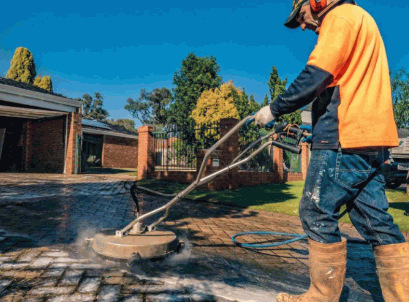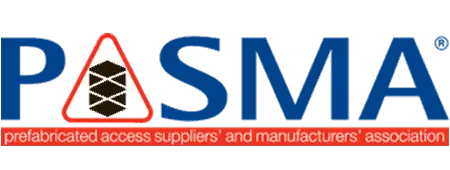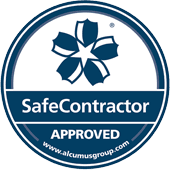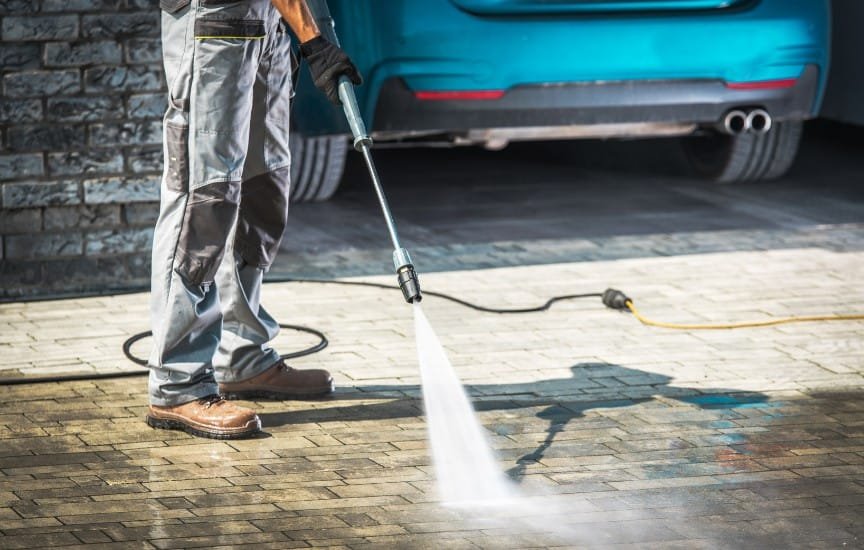
If you're lucky enough to have a driveway on your London property, you'll know just how dirty and grimy they can become.
This not only looks bad, but it can also compromise the material and shorten its lifespan. Also, oil stains, moss growth, and mould and algae are slipping hazards that can cause nasty falls.
So, driveway cleaning is an essential part of routine maintenance. Instead of doing this yourself, it's usually best to hire a professional driveway cleaning team. While it might seem a simple job, here in London, the combination of weather, pollution, dead leaves and traffic makes it a challenging task to tackle without professional help.
But how much does it cost to clean your driveway if you live in the London area?
The London Power Washing Team is here to shed some light on the subject!
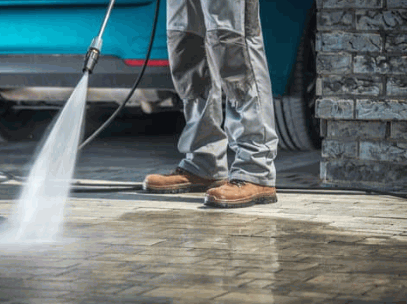
A clean, well-maintained driveway boosts the overall appearance and kerb appeal of your property, while a grimy, moss-infested drive has the opposite effect.
Also, an accumulation of dirt causes deterioration, leading to an uneven surface that presents tripping and falling hazards. Moss and surface grease add to the problem, creating a slippery environment that can result in serious injury.
A damaged surface allows water and weeds to penetrate, leading to further cracks and deterioration. Eventually, you're faced with expensive repairs or the cost of a new driveway!
So, keeping your driveway clean extends its lifespan, makes it safe for everyone to use, and adds value and appeal to your home.
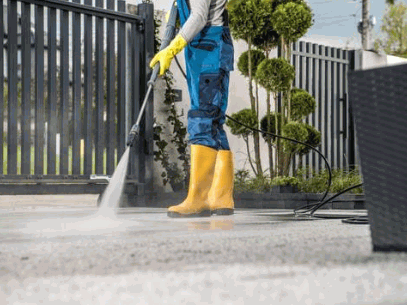
There are several factors that determine the overall cost to clean a driveway, so we'll examine these first.
A small driveway will cost less to clean than a large driveway. The larger your driveway, the higher the cleaning cost. This is because the contractor will spend more time on the project and use more materials and water.
But you knew that already!
However, the cost per square metre doesn't necessarily increase at the same rate. That is; you may get a discount for larger areas. So, while an initial rate for a small-sized driveway might be £6 per square metre, a very large driveway may be set at the same rate, but with a 20-40% discount.
To give you a better idea, here are some average driveway sizes:
Larger driveways are less common in London, generally due to the restricted space and the cost of land.

To keep costs down slightly, clear away any weeds or loose debris by hand before the driveway cleaners arrive!
This blog focuses on the London area, and prices tend to be on the higher side here. Generally, pressure washing prices are higher in the south, and even steeper in and around London.
However, you can save money by comparing driveway cleaning quotes from different companies and getting a good deal.
That said, you'll find the London Power Washing Team's competitive prices hard to beat!
Different materials may require different treatments, such as specialist cleaning agents or processes, and this can raise the cost.
So, the cost may differ depending on whether you have a block paving, tarmac, concrete or brick driveway.
Our quick guide to driveway materials illustrates this in more detail:
Resin-bound driveways are made by binding aggregates (small stones and gravel) with resin, creating a permeable, smooth, and decorative surface. One of their main benefits, aside from being amazingly durable, is that they are low-maintenance and resistant to weeds.
For resin driveways, we recommend soft-washing with a low-pressure system to protect the resin surface. Professional cleaners mostly use a biodegradable cleaning solution to remove organic growth, followed by a gentle rinse, with about the same pressure as a garden hose. For minor stains, spot treatments may be used. It's important to avoid using harsh chemicals as these can compromise the resin’s integrity.
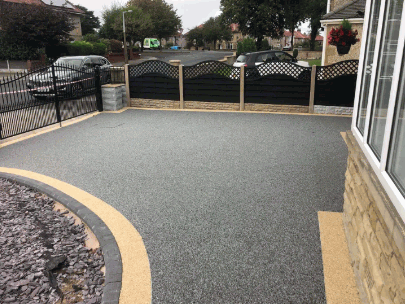
Tarmac and asphalt* are widely used in the UK for their durability and quick installation. Known for their smooth, black appearance, they're ideal for driveways with high traffic.
We typically suggest low-pressure washing for tarmac to avoid surface damage, as high-pressure can break down the binding agent that holds the material together. A detergent solution may be applied for oil or fuel stains, after which the surface is thoroughly rinsed. Restorative treatments are often applied to refresh the colour and seal the surface.
*Similar materials, but not identical! Tarmac is made from tar and aggregates, while asphalt is made from bitumen and aggregates. Tarmac is quicker, easier and generally cheaper, although asphalt is the more eco-friendly of the two options as it can be reused or recycled.

This amazing material mimics the appearance of stone, brick, or tile perfectly. In fact, it's often difficult to tell them apart from the real thing! It’s a durable option that adds visual interest with various patterns and colours, from regular geometric patterns to crazy paving.
Stamped concrete can handle a bit more pressure, so pressure washing on a low to moderate setting is typically used, along with mild detergents to clean without eroding the stamped design.
We highly recommend renewing the sealant after cleaning, as this protects the patterns and colours from fading and weathering.
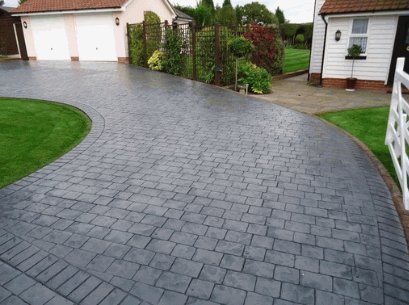
Made from concrete or clay blocks arranged in various patterns, this type of driveway is extremely popular for its durability and range of design options. It’s a common choice these days for both traditional and modern homes, adding class and elegance to any home. As with resin-bound examples, they look especially impressive with a driveway gate!
Professional cleaners often use pressure washing at a moderate setting to clear dirt, moss, and weeds from the joints. A weed treatment may be applied, and once clean, a re-sanding of the joints helps with kiln-dried sand to stabilise the blocks. Again, sealants can also be applied to protect the paving and enhance colour.
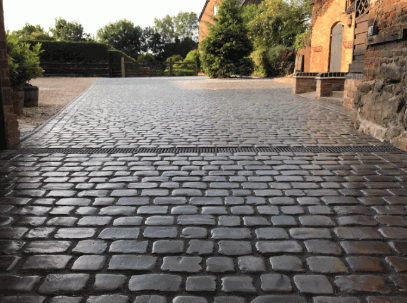
Basic concrete driveways (as opposed to modern, imprinted versions) aren't as popular as they once were, but there are still plenty around. In their time, they were a low-maintenance and cost-effective option, often chosen for their durability and simplicity. They were usually poured as a single slab, although larger driveways may be made up of two or three slabs with an expansion joint.
Because most of these are several decades old now, they need regular attention to keep them in good shape.
Pressure washing is ideal for older concrete, using an appropriate pressure level to avoid surface wear. For stained areas, detergents or mild chemical treatments can help lift oil or rust marks. Professionals may also apply a sealant post-cleaning to protect against future staining and wear.
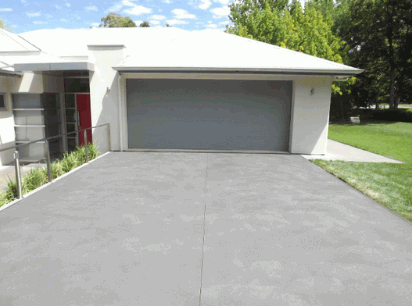
Now we know a bit more about the materials, let's investigate the processes and methods used for a professional driveway clean...
The humble pressure washer is perhaps the most commonly used method, but most cleaning companies these days offer a range of very effective alternatives. Any company worth hiring will always recommend a better method if they believe it's more suitable and will bring about better results.
We'll compare each one here to find out more:
Pressure washing uses a stream of cold water delivered at high pressure to shift dirt and grime. It's extremely effective but not always suitable for all materials.
At between 3-4,000 PSI, professional pressure washers are far more powerful than your average model, and require expert handling.
Essentially, a jet washer and a pressure washer are the same thing. People use either name to describe the same machine, which is fine, although power washing is different (see below) so it can get confusing!
Check out our post “How much does pressure washing cost in London”.
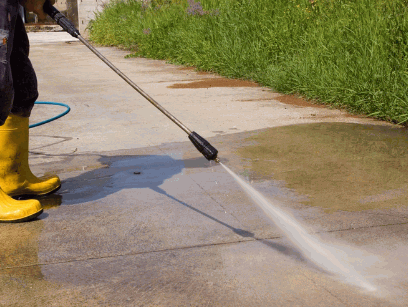
Steam cleaning for driveways is a powerful cleaning method that uses high-temperature steam to lift and remove deep-seated dirt, grime, moss, algae, and stubborn stains from driveway surfaces. Unlike traditional pressure washing, steam cleaning relies on heat rather than high water pressure, making it ideal for surfaces that may be sensitive to forceful washing, such as resin-bound driveways or delicate stone.
The steam effectively sanitises the surface and kills mould, bacteria, and organic growth without the need for harsh chemicals, making it an eco-friendly option. Steam cleaning is particularly beneficial for driveways with heavy biological growth or stubborn stains, providing a thorough clean while preserving the integrity of the driveway material.
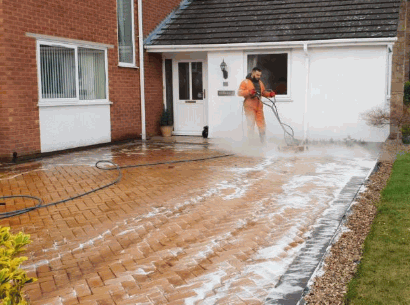
Unlike pressure washers, power washers use hot water, giving them a slight edge when it comes to shifting tough stains and heavy grime. The combined force of the water and heat dislodges built-up debris, making it ideal for heavily soiled driveways that need a deep clean.
Even so, if you do power wash your driveway, you need to get the water pressure right, especially if you have a tarmac, concrete or brick driveway. The high pressure coupled with the heat can, surprisingly, destroy the surface of the drive.
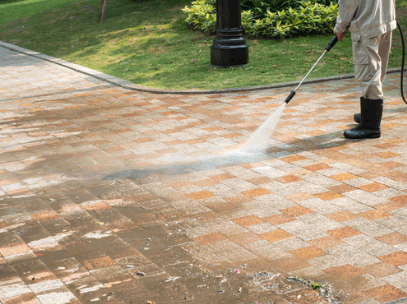
Softwashing uses low-pressure water combined with specialised biodegradable cleaning solutions to safely and effectively remove dirt, algae, mould, and other biological growth from exterior surfaces.
This makes it ideal for more delicate materials that can be damaged by power washing or pressure washing. Like steam cleaning, it's also an eco-friendly option as now harsh or harmful chemicals are involved in the cleaning process.
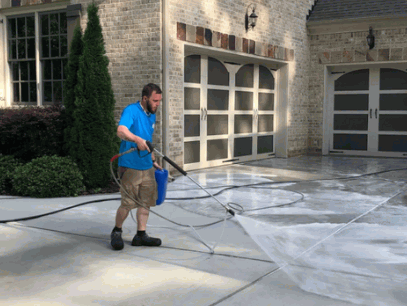
While consumer advice websites suggest an average price of around £250 for driveway cleaning, we need to keep in mind that anyone based in London will generally fall at the higher end.
With this in mind, we'll look at a range of costs to give you an idea of what to expect:
Pressure washing is effective for block paving as it clears dirt, moss, and weeds from the surface and joints. Many companies also include re-sanding the joints after cleaning, which can slightly increase the cost.
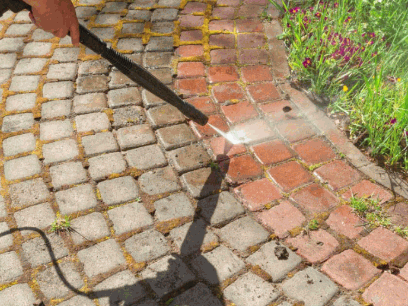
Resin-bound surfaces are sensitive to high-pressure cleaning, so softwashing is ideal. This low-pressure method combined with biodegradable cleaning solutions removes algae and stains without damaging the resin. Eco-friendly solutions may add a small cost premium but provide a thorough, gentle clean.
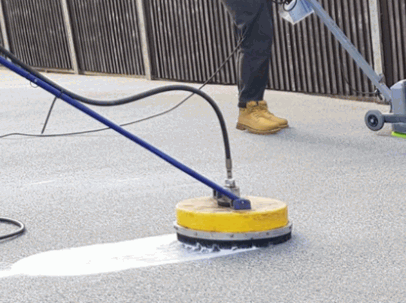
Steam cleaning is excellent for concrete driveways with deep-seated stains, including oil and algae. The high heat breaks down stubborn dirt without requiring harsh chemicals, which is beneficial for environmentally sensitive areas. This method is especially effective on heavily soiled concrete driveways.
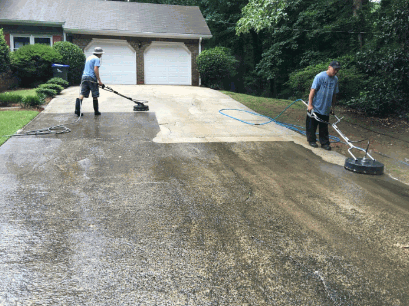
Tarmac can handle power washing, but using hot water is particularly effective for removing grease, oil, and moss without damaging the surface. Hot water helps break down contaminants that may be harder to remove with cold water alone, while also sanitising the surface.

The cost to clean a driveway might seem high, but it's all about the process along with the skills and equipment involved.
Let's check out a typical job to see what's involved...
The process starts when you contact the company, provide your details and get a quote. When you decide to go ahead, a driveway specialist should visit the property and inspect the site (this may happen before the quote is given, depending on the company).
The inspection identifies any hazards or obstacles and helps the cleaners decide the best methods and approach.
Weeds will be removed along with loose debris, and other organic growth will be scraped from the surface, leaving it ready for cleaning.
If necessary, minor repairs will be undertaken. This is particularly important if it is being pressure washed, as it may lead to further damage.
The professionals use the appropriate cleaning equipment, working methodically and efficiently to ensure that the entire driveway is thoroughly cleaned.
This may take several hours and include multiple passes over the surface.
Depending on the chosen method, cleaning agents will be applied to remove tough stains, organic growth and surface grease.
Once the surface is clean and dry, a protective coating can be applied.
The site is checked over to make sure the work is up to scratch, and then the cleaning technicians tidy up the area and leave you with a lovely clean driveway!
Take a look at our post "How much does patio cleaning cost in London".
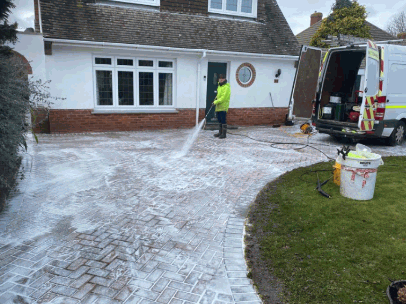
As with most tasks of this nature, you have the option of cleaning your own driveway if you feel able. After all, how hard can it be to wash a driveway?
The truth is that there are many good reasons why it's best left to the professionals!
When it comes to heavy-duty cleaning of exterior spaces, most consumers favour the trusty pressure washer. While this is usually a good choice, few people are experienced or skilled enough to use these machines properly, resulting in patchy and unsatisfying results.
If you do intend to pressure wash (or jet wash) your driveway, you'll need to buy or hire an adequate machine. You'll also need to make sure you use the correct equipment and technique: using the wrong nozzle, or holding the lance at the wrong angle, can damage the surface of some materials. The same applies to the pressure; using too much power risks serious and permanent damage.
So, on top of the cost of hiring or buying a pressure washer, you have the added stress of getting everything right in order to achieve satisfactory results.
A skilled, experienced driveway cleaning specialist will provide perfect results every time.
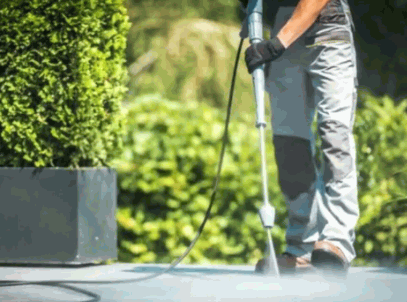
Ideally, regular driveway cleaning and sealing should form part of your driveway maintenance regime.
While this might seem a bit OTT, it's a good way to keep your driveway in good condition and avoid expensive repairs. And if you've invested in a new driveway, it's a great way to protect that investment.
Driveway cleaning costs, on the whole, will be far cheaper in the long term than having to constantly repair or even replace your driveway due to damage!
Applying a good-quality sealer will protect your driveway from the elements and make the cleaning process a quick and simple job. This simple step helps to keep the cleaning cost down in the future and keeps your driveway in excellent shape for a long time.
So, if you're in the London area and your driveway is in need of a good clean, get in touch with the London Power Washing Team for friendly advice, affordable prices and a professional service that you can trust.
